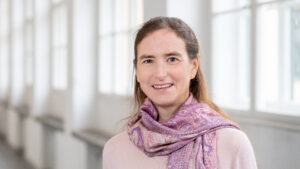
Andrea Reichenberger is a philosopher and historian of science and technology. She specialises in researching women and gender issues at the intersection of physics, mathematics, computing, and AI. Her primary motivation for teaching and research is to promote a sustainable future through the study of the history of science and technology. She is currently the Principal Investigator of a DFG project at TUM, focusing on women in the history of quantum physics. She holds a PhD in the philosophy of technology from Paderborn University. She was a research group leader in the Department of Mathematics at the University of Siegen and a substitute professor of the history of technology in the STS department, TUM. Reichenberger has written a book on the French mathematician, physicist and philosopher Émilie du Châtelet (Springer, 2016), and has published over 50 papers, including more than 20 peer-reviewed articles in journals such as Physics Today, the British Journal for the History of Mathematics, History and Philosophy of Logic, and Language and Communication.
deutsch
Andrea Reichenberger ist Wissenschaftsphilosophin und Wissenschaftshistorikerin. Sie ist spezialisiert auf die Erforschung von Frauen und Geschlechterfragen an der Schnittstelle von Physik, Mathematik, Informatik und KI. Ihre Hauptmotivation für Lehre und Forschung ist die Förderung einer nachhaltigen Zukunft durch die Erforschung der Geschichte von Wissenschaft und Technologie. Derzeit ist sie Leiterin eines DFG-Projekts an der TUM, das sich mit Frauen in der Geschichte der Quantenphysik beschäftigt. Sie hat an der Universität Paderborn in Technikphilosophie promoviert, war Forschungsgruppenleiterin am Department Mathematik der Universität Siegen und Vertretungsprofessorin für Technikgeschichte am STS Department an der TUM. Reichenberger hat ein Buch über die französische Mathematikerin, Physikerin und Philosophin Émilie du Châtelet geschrieben (Springer, 2016) und über 50 Artikel veröffentlicht, darunter mehr als 20 peer-reviewed Artikel in Zeitschriften wie Physics Today, dem British Journal for the History of Mathematics, History and Philosophy of Logic und Language and Communication.